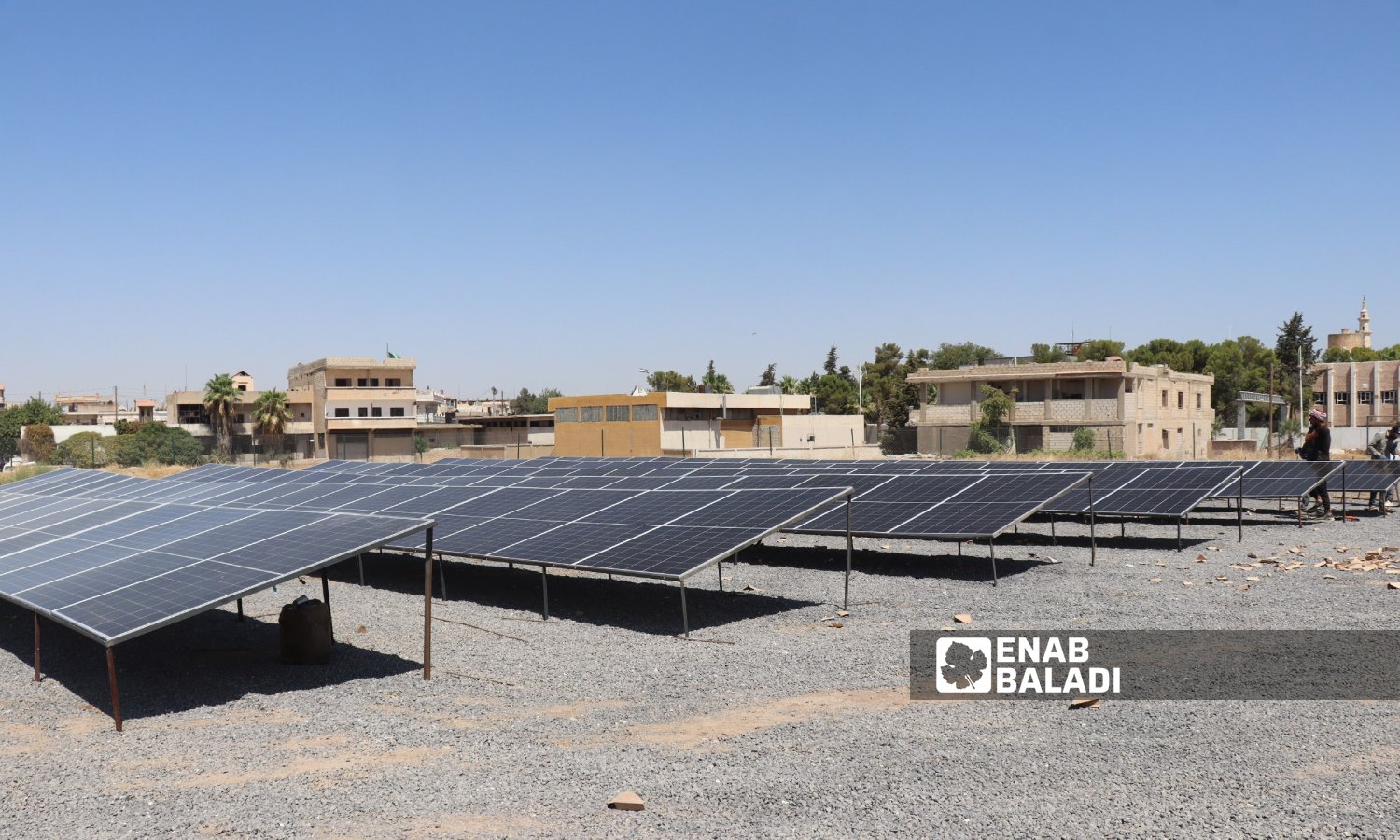



Ras al-Ain – Hussein Shaabo
It has become an urgent necessity to rely on solar energy to generate electricity in the Ras al-Ain area, north of al-Hasakah governorate, northeastern Syria, as a result of the absence of other alternatives, amid continuous cuts in the electricity supply, the loss of fuel from time to time and its high price.
Solar panel installation equipment arrives in the region via transit from Turkey, and enters through the Ras al-Ain and Tal Abyad border crossings, which has contributed to its widespread use recently.
The presence of about 15 centers specialized in selling energy systems in the region during the recent period opened the door to competition among merchants.
This was accompanied by price offers to encourage people to buy them, especially for owners of agricultural fields that have become completely dependent on solar energy to generate electricity and enhance agricultural production, and operate hydro-mechanical systems and automatic irrigation, which contributed to improving crop irrigation and providing water with high efficiency and lower costs for farms.
Munther Kreit, who lives in the city of Ras al-Ain, told Enab Baladi that he resorted to installing solar energy in his house because of the intense heat, the complete power outage in the area, in addition to the high cost of running generators due to the high fuel prices.
Kreit paid $900 for the installation of a complete system, and although it is not a small amount according to him, his need for electricity and the smooth operation of all devices made the amount a very useful investment.
Mohammad Saleh, the owner of a center for selling solar energy equipment in Ras al-Ain city, told Enab Baladi that the demand for solar energy panels has greatly increased during the past years as a result of the power outages, the scarcity of fuel and its high prices.
The cost of the complete home system ranges between $800 and $1,100 as a maximum, as it is able to fully operate the electricity in the house 24 hours a day, according to Saleh.
The cost of one energy panel is about $40 to $200, depending on its capacity, while the cost of installing the system in an agricultural project varies according to the area of the land, and starts from about $5,000, and is capable of irrigating 25 agricultural dunams, and may reach about $50,000 and serves about 300 dunams (Dunam is about 900 m2).
Salman al-Mardali told Enab Baladi that the cost of solar panels on his agricultural land in Ras al-Ain amounted to about $20,000, which prompted him to give up some properties, such as selling a tractor and a car to secure the cost.
After the installation of the project, the farmer expressed his satisfaction with the results, as working with solar energy led to the return of life to his land, and he was able to complete his work without frequent mechanical failures, which allowed him to focus without worrying about fuel savings or facing recurring problems with generators.
The head of the Agriculture Office in the local council of Ras al-Ain, Omar Hammoud, told Enab Baladi that solar energy has become one of the most important solutions that residents and farmers in the region resort to.
According to Hammoud, the number of agricultural projects that depend on solar energy in the region has reached 510, because it allows farmers to operate irrigation systems with high efficiency.
This is reflected in improving crop productivity in innovative ways, and contributes to enhancing agricultural sustainability and improving production performance.
Hammoud stressed that the use of solar energy has become an economically acceptable alternative for farmers, as they can benefit from the sun as a free source of electricity generation.
This, in turn, reduced the costs associated with purchasing fuel and maintaining generators, in addition to reducing dependence on oil natural resources and reducing harmful emissions to the environment, he added.
The number of homes in the region that depend entirely on solar energy to generate electricity has reached about 8,120, and the number is constantly increasing as a result of the widespread demand for solar energy systems in the region, according to what was stated by the Director of the Chamber of Commerce and Industry in Ras al-Ain, Habo al-Hadar.
Al-Hadar explained to Enab Baladi that solar energy projects are implemented daily for homes and agricultural projects, which reflects the urgent need to rely on this type of energy to meet the daily needs of residents and farmers.
Al-Hadar considered that solar energy projects are a sustainable option that contributes to improving the quality of life and reducing harmful emissions to the environment. It also represents a promising investment opportunity for new merchants, which contributes to strengthening the local economy and developing the region’s infrastructure, he said.
The armed conflict led to severe damage to four of the 14 power stations, which amounted to about 18% of the electrical capacity throughout Syria before 2011, according to a research study by Dr. Sinan Hatahet and Dr. Karam Shaar.
According to the study, the last ten years have exacerbated the service conditions related to electricity to a large extent in Damascus, as the per capita share of the state’s electricity consumption has become 15% of what it was in 2010.
if you think the article contain wrong information or you have additional details Send Correction